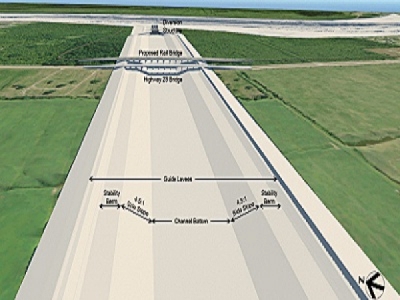
Posted on May 22, 2017
By Mark Schleifstein, NOLA.com
The Army Corps of Engineers expects to make changes by October in a key permit for Louisiana to start building the Mid-Barataria Sediment Diversion or other major environmental projects, a corps official said Wednesday (May 17). But it remains unclear whether the changes will accelerate the permitting process.
Col. Michael Clancy, commander of the corps’ New Orleans District office, told the state Coastal Protection and Restoration Authority that corps headquarters leadership is expected to approve changes in the requirements for a so-called Section 408 permit. These are required for any work that affects corps projects, such as levees and navigation channels.
But he warned that the streamlining efforts were aimed at “routine” 408 requests, and that the larger projects would still be the subject of significant review. Clancy has said the corps likely won’t complete work on permits for the Mid-Barataria diversion, the most expensive coastal restoration project in Louisiana history, until the fall of 2022, even though the state is paying the corps $1.5 million to speed the process.
The planned revision in the rules follows recent visits to the New Orleans District office by headquarters officials to discuss the district’s 408 permitting process. Gov. John Bel Edwards has urged President Donald Trump to speed the permitting process for the Mid-Barataria and other major projects, both in a March 8 letter requesting the projects be included in the president’s infrastructure funding bill and in an April 18 coastal declaration of emergency.
The Trump administration has seemed interested in listening to the state’s concern. It asked Louisiana to produce a white paper outlining the state’s problems with the corps permitting process, coastal authority Chairman Johnny Bradberry said.
Wednesday’s appearance by Clancy was requested by the authority board, which is concerned about the permitting process for coastal restoration work as well as delays that residents and businesses face in obtaining permits for minor projects, such as installing docks or pilings.
The 408 permit is one of three required for most major coastal projects. At the moment, it is required before work may begin on the other two permits:
– One under Section 404 of the Clean Water Act
– One under the Rivers and Harbors Act of 1899.
Those other permits are often considered together. For large projects, they require a formal environmental impact statement.
That 408 permit process was changed in 2015 by national corps leaders to require more extensive coordination with other federal agencies over whether a project complies with provisions of the National Environmental Policy Act, Clancy said. The changes required additional environmental studies and approvals of those studies by the Environmental Protection Agency, the National Oceanic and Atmospheric Administration and the Department of Agriculture, often mirroring the information contained in the environmental impact statement required by the Clean Water Act.
The changes also required more consultation with recognized Native American tribes, of which there are 11 in Louisiana, Clancy said. Such tribal consultation also is required under the Clean Water Act.
The changes in the 408 permitting process have added months — even years — to some permit requests, state officials contend.
Clancy said he could not say what changes will be made in the 408 permit requirements, but they likely will return more control over the permitting process to local corps offices, which could reduce permitting time. He said the New Orleans office already is streamlining its review and decision-making process for the 408 permit, and will host workshops for state officials and others once the permit changes are approved in October.
The New Orleans office already handles about 7,000 regulatory actions a year, including issuing 2,400 permits. A key part of its workload is determining whether land where a project is planned contains “jurisdictional wetlands” that will require a permit. The Trump administration has moved to rescind an Obama regulation that critics said extended the reach of the federal regulations beyond what federal law requires, which also has delayed some private permit requests.
Clancy said it takes about 10 months to complete work on an individual permit. But at least one state Department of Transportation and Development request has been awaiting approval for five years.
Bradberry also chided Clancy over complaints he’s received from Louisiana residents that corps officials have not been answering phone calls and emails of permit applicants. Clancy said he’d look into those complaints.
Source: NOLA





